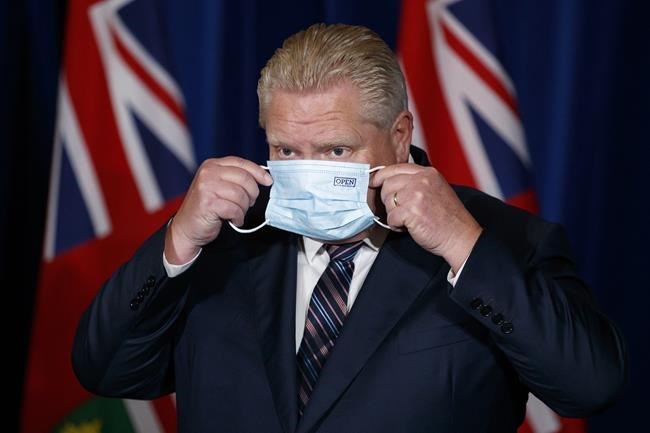A look at the latest COVID-19 news in sa╣·╝╩┤½├Į:
ŌĆö Ontario Premier Doug Ford says he doesn't see the province's mask mandates ending any time soon. Ford was speaking with Belleville radio station CJBQ and was asked about his recently announced plan to start easing COVID-19 restrictions. The premier said he can't stand shutdowns and wants to get back to normal, but wants to do it properly and cautiously, which is why there will be at least 21 days between each reopening phase. When asked if a mask mandate will be lifted, Ford said he couldn't say that it will be soon.
ŌĆö Quebec will soon begin lifting some of the COVID-19 restrictions that have been in place since December, beginning with easing private gathering limits and allowing restaurant dining rooms to reopen, Premier Fran├¦ois Legault announced. "I told you last week that we were seeing the light at the end of the tunnel," Legault told a news conference in Montreal. "I think we can say today that we are out of the tunnel." He cautioned, however, that the province's health system is "in rough shape" and it will take time to build the hospital capacity the province needs. As of Monday, restaurants in Quebec will be able to welcome diners, with capacity limited to 50 per cent and no more than four people, or two different households, at a table.
ŌĆö British Columbia's vaccine card program is being extended until June 30. ┬ĀProvincial health officer Dr. Bonnie Henry says the government is trying to mitigate the risks of spreading COVID-19 and the vaccine card is specifically designed to allow certain businesses and activities to remain open. She says the province will re-examine the proposed end date if conditions improve, but for now, it's an important tool to contain the spread of the virus. While the number of COVID-19 infections is dipping, Henry says hospitalizations are at the highest point of the pandemic.
ŌĆö Alberta has a record 1,377 people in hospital with COVID-19 and emergency wards are facing long wait times and multiple red alerts, which means no ambulances are available at a given time. Health Minister Jason Copping said there's a 30 per cent increase in COVID-19 hospital cases in a week. The test positivity rate remains high at 43 per cent. Emergency doctors have said patients are being treated in hallways. Copping said while the Omicron wave of the pandemic appears to be receding, hospitalizations are still expected to increase in the short term due to the time lag between infection and illness.
ŌĆö One Nunavut community is under a strict lockdown as COVID-19 spreads rapidly among households. All offices and schools in the Baffin Island community of Igloolik, where about 1,600 people live, are closed and travel is restricted. Chief public health officer Dr. Michael Patterson says there are 17 active COVID-19 cases listed in the community, but notes the numbers are much higher because of a lag in testing.┬Ā
ŌĆö Yukon's education minister says the territory will no longer be issuing COVID-19 exposure notifications at schools. Jeanie McLean says the Yukon Centre for Disease Control is monitoring class attendance in an effort to ensure children are safe at schools. She says keeping schools open is a top priority for the territory, although she acknowledged the stress on staff in making sure schools are safe and remain operating. McLean says she understands parents may be concerned about no longer receiving COVID-19 exposure notices from schools, but health authorities are closely monitoring attendance.┬Ā
ŌĆö Newfoundland and Labrador students in kindergarten through Grade 12 packed their book bags and headed to school for the first time since the holiday break began in December. Students in the province have been learning remotely since Jan. 4, when the Omicron variant of the novel coronavirus was still driving daily case counts skyward. Officials are reporting 296 new confirmed cases compared with 493 on Jan. 4, though the case count does not include those who may be sick but don't qualify for a test. Students were required to take two rapid COVID-19 tests before heading to class, but the province's teachers association said the majority of its members felt it was unsafe to resume in-school learning.
ŌĆö Nova Scotia is reporting five more COVID-19-related deaths and 492 new lab-confirmed cases. Health officials say four people died of the disease in the Halifax area and a woman in her 80s died in the province's eastern zone. Officials had also reported five COVID-19 deaths on Monday. Nova Scotia has reported a total of 136 COVID-19 deaths since the start of the pandemic.
ŌĆö Prince Edward Island is reporting one more COVID-19 death, for a total of nine since the start of the pandemic. Chief public health officer Dr. Heather Morrison says a person in their 80s is the latest resident to die of the disease. There are 10 patients in hospital, including two people in intensive care.
ŌĆö New Brunswick's chief medical officer of health says that while hospitalizations continue to rise, they are below original projections, which indicates people have responded to the call to reduce their contacts. Dr. Jennifer Russell confirmed there are 138 people hospitalized with COVID-19 ŌĆö an increase of seven from Monday. There are 11 people in intensive care and three people on ventilators. In a statement, Russell said three more people have died as a result of COVID-19. ┬Ā
This report by The Canadian Press was first published Jan. 25, 2022.
The Canadian Press



